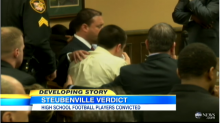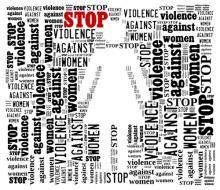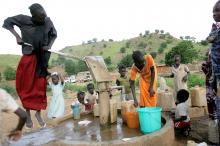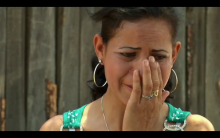sexual assault

We have learned from the crisis at Penn State University and other incidents that have gained national attention that it is not only religious authorities that turn a blind eye to abuses of power. The educational, legal, social service, and policing systems are broken when it comes to protecting children, and others who are vulnerable, from abuse.
Lest we forget our history and think that this is a uniquely 20th and 21st century problem, we need only turn to the Bible. In II Samuel, we are reminded that abuses of power, lust, and rage have always been part of the human experience.
An incident described II Samuel happens not in a religious or educational institution but in a family. It is not an isolated incident; it does not develop out of thin air. It is a case of “like father, like son.” Amnon’s father is King David, who in II Samuel 11, sees Bathsheba bathing and uses his power to have her brought to him so that he may “lay” with her.
It is only two chapters later that we read that Amnon, David’s son, is tormented by the beauty of his half-sister, Tamar. Amnon does not have the authority that his father David has, so he must use trickery instead of sheer power to get what he wants. After Amnon violently “lays” with Tamar, he is filled with hatred for her and forces her to leave his sight. In doing this, he shames her even further.
The scandal is not just that Amnon violates Tamar and the law of Israel, but when Tamar cries and ritually mourns her pain and disgrace she is told to be quiet. Her brother Absalom tells her to stop brooding over the episode. And while Absalom and their father, King David, are angry with Amnon for what he has done to Tamar, neither David nor Absalom even talks to Amnon about it. David does not punish his beloved firstborn son.
Perhaps one positive thing we can say about this story is that Tamar has a name; she is not anonymous like so many other powerless women in biblical stories. Tamar is named and remembered.

Though the church remains stuck in a culture of silence on sexual abuse, advocates are steadily building the platforms for individual voices to change the narrative. The depth of reconciliation that plays out upon these platforms can be profound. Rachel Halder, founder of Our Stories Untold — a blog that hosts stories from survivors of sexualized violence within the Mennonite church — has witnessed such moments happen in real time.

Violence against women is the most prevalent and the most hidden injustice in our world today. From rape as a weapon of war, to human trafficking, to the attack of a young girl seeking an education, the treatment of women and girls across the globe is in a state of crisis.
And we don't even need to leave our own shores to encounter staggering statistics. Here in the U.S., 1 in 5 women have been raped in their lifetime — a number that only jumps when you realize that 54 percent of sexual assaults are never reported. More than 1 in 3 women have experienced some kind of intimate partner violence. Sexual assaults in the U.S. military continue to rise — with an estimated 26,000 in 2012 alone — even as its leaders claim to be addressing the epidemic.
As I lay out in my book On God’s Side, what has been missing from this narrative is the condemnation of these behaviors from other men, especially men in positions of power, authority, and influence — like those in our pulpits. In a section of that book, I say we need to establish a firm principle: the abuse of women by men will no longer be tolerated by other men. The voices of more men need to join the chorus to make that perfectly clear.
It's time for all people of faith to be outraged.

Every family involved, every neighbor, even those of us who look on in horror, will be forever stained by this horrific, sustained act. If any human act warrants eternal punishment, this clearly does. As much as I consider the death penalty barbaric, in this case death seems far too merciful. The perpetrator will never breathe a single breath free of shame and disgrace. The sin, by any standard, is beyond the pale. The case makes me wonder what judgement, punishment, and mercy might even mean. And like everyone else, my first impulse is to put as much distance as I can between this ‘sin’ and my own.
But we lie to ourselves if we imagine that our sin is no less ugly in the eyes of God. Is my, or your sin, really so different?

Elizabeth Smart, who was kidnapped from her home in Salt Lake City and held in captivity for nine months in 2002 at age 14, spoke out about her experience at a human trafficking panel at Johns Hopkins University last week. Her main focus: educating children and giving them the skills to fight back.
She recounted her own experience in abstinence education.
I remember in school one time, I had a teacher who was talking about, well about abstinence. And she said, 'Imagine that you're a stick of gum, and when you engage in sex, that's like getting chewed. And then if you do that lots of times, you're going to become an old piece of gum, and who's going to want you after that?'
… for me, I thought, 'Oh my gosh, I'm that chewed up piece of gum. Nobody re-chews a piece of gum. You throw it away.'
And that's how [easy] it is to feel like you no longer have worth; you no longer have value. Why would it even be worth scraping up? Why would it even make a difference if you are rescued? Your life no longer has value.
Watch the full speech here.
Due to sequestration, programs that fight domestic violence and sexual assault will lose 20 million dollars in funding this year. Congress has voted to restore funding to tuition aid for service members and the Federal Aviation Administration but not the Violence Against Women Act. It is estimated 70,120 fewer domestic violence victims will have access to recovery programs and shelters and 35,900 fewer people will get help obtaining non-shelter services such as restraining orders and sexual assault treatment. Mother Jones reports:
"The tower is understaffed and the rescue plane can't land," says Kim Gandy, president and CEO National Network to End Domestic Violence. "We're talking about really vital services to people who are already in a terrible situation and really in need of emergency services—and there aren't alternatives."
Read more here.

The tragedy of the Steubenville rape case has provided a moral challenge to our nation. We are caught up in a highly emotional cycle of blame as we debate who the real victim is in this case. I find myself asking two questions: Why is our nation obsessed with the story and what does this story mean for us as individuals and as a culture?
My Family
I’ve always wanted a daughter. The problem is that adult Ericksen dudes tend to produce baby Ericksen dudes. My dad has 4 siblings — all brothers. I have mostly male cousins. So, when my wife and I started having children … yep … two dudes.
My Church Family
I’ve been a youth pastor for about six years, and for a long time I thought the closest I’d ever get to having a daughter was to pseudo-adopt the girls in my youth group. Actually, they first pseudo-adopted me by claiming me as their “Father” on Facebook. (Hey, it’s on Facebook, so my pseudo-fatherhood status is legit.) As something of father figure for these teenage girls, each youth group session I discussed with young women and men how the Christian faith is leading us into patterns of love and non-violence. Frequently after our sessions, one of my pseudo-daughters will tell me she’s dating a boy. So, of course, after teaching them about non-violence, I say to each of them with a straight face:
If he ever touches you, I will personally kick his ass.

(Note: This post contains some frank and graphic discussions of sex and sexuality.)
Two boys from a Steubenville Ohio high school (I’ve opted not to use their names, though they are readily publicized by other media) have been sentenced to time in a juvenile detention center for the rape of a 16-year-old classmate who was reportedly so drunk at a party that she could no longer stand on her own. Aside from “digitally” raping the girl with their hands, reportedly multiple times, one of the boys took photos of the girl without her clothes, shared them via social media, and both young men bragged about the incident to their social networks following the incident.
As the father of both a boy and a girl, I was particularly angered and disturbed by this story. The very fact that such things happen in a supposedly civil society is a stark reminder that we have only a tenuous hold on the well-being of our kids once they leave our sight. We can only hope and pray that we’ve empowered them with the sense of autonomy, respect, compassion, and restraint to keep them either from becoming victims of such violations, or perhaps even perpetrators of it themselves.
But once I get beyond my initial feelings about the whole situation, I’m left wrestling with a number of questions that still feel terribly unresolved.

Good news: the Violence Against Women Act passed the Senate this afternoon. While the bill still must proceed to the House of Representatives, this is a promising step for women across the country.
VAWA provides much-needed services and protections for women, which should not be a controversial issue. However, the bill expired in 2011 and has yet to be reauthorized, with most of the delay coming from a debate over whether the protections can extend to Native American women living on reservations.
A recent story shows the importance of extending these protections to Native woman: the woman profiled was attacked by her (white) husband, but neither the tribal court nor the local police felt they had proper authority to protect her.
This is not an isolated incident: during the Senate hearing on the bill, Sen. Maria Cantwell (D - Wash.) pointed out that Native American women are raped and assaulted at 2.5 times the national rate, and fewer than 50 percent of domestic violence cases on reservations are prosecuted.

As much as we like to believe we live in a safe country for women, we know this is not the case. Women and girls across the country are subject to rape, abuse, intimidation, and sex trafficking, with the number of victims growing each day.
Progress has been made over the past decades, thanks in part to the Violence Against Women Act. This policy protects women by providing everything from funding for rape crisis centers to increased collaboration with law enforcement to hold perpetrators accountable. VAWA is our country’s promise to women and girls that we will not allow them to be violated and abused.
The Violence Against Women Act is up for a vote in the Senate next week, and Americans from every corner of the country are calling our policymakers to reauthorize this important legislation. Since it was first passed in 1994, VAWA has received strong bipartisan support and shown its effectiveness in making communities safer, healthier, and better stewards of their resources (in the first 6 years since it was introduced, VAWA saved communities $12.6 billion).
VAWA expired in 2011, and has yet to be reauthorized.

On my desk, next to my laptop, is a can of seltzer water. My grapefruit-flavored, bubbly water sits about four inches away from my left hand as I write. When the can is empty, I might take another from the fridge or fill up a water bottle at the kitchen sink.
Water drives my day, but I rarely think about it. I cook pasta in it. I heat water to make tea. I fill a bucket to mop the floor and a draw a bath with hot water and soak in it. At the moment, my dishwasher is growling away, and I’m waiting to hear the pleasant beep that alerts me that the clothes in the washer downstairs are clean.
I’ve never considered water a women’s issue. Not until this past week, that is. On Friday, the day before World AIDS Day 2012, I had the privilege of attending World Vision’s Strong Women, Strong World luncheon in New York City. Strong Women, Strong World is a new initiative “supporting sustainable change in some of the difficult places in the world to be a girl or a woman.” The focus of the day was water.
The Honorable Melanne Verveer, U.S. Ambassador at-large for Global Women’s Issues, spoke at the event. She celebrated the progress humanitarian organizations such as World Vision have made in the effort to eradicate HIV/AIDS, but reminded us that the number of people living with HIV is at an all-time high. In 2010, HIV/AIDS killed 1.8 million people. Sixty percent of those living with HIV are girls and women, and AIDS is the leading cause of death of women of reproductive age (15-44 years old) globally.
“HIV,” Ambassador Verveer said, “has the face of a woman.”
"From a scientific standpoint, what's legitimate and fair to say is that a woman who is raped has the same chances of getting pregnant as a woman who engaged in consensual intercourse during the same time in her menstrual cycle," said Dr. Barbara Levy, vice president for health policy at the American Congress of Obstetricians and Gynecologists.
One widely accepted study suggests a 5 percent pregnancy rate following rape, resulting in 32,000 pregnancies each year.
The report was from the Medical University of South Carolina and was published in the American Journal of Obstetrics and Gynecology and cited by the U.S. Centers for Disease Control and Prevention.
But placing an exact figure on post-rape pregnancy is problematic, primarily because rape is thought to be underreported. Another factor is the availability of over-the-counter emergency contraception, which can prevent fertilization when taken after intercourse.
One study from the journal Human Nature in 2003 suggests pregnancy rates are higher after a rape when compared with consensual sex because of the inconsistency of birth control use.
“It isn’t enough to talk about peace. One must believe in it. And it isn’t enough to believe in it. One must work at it.” –Eleanor Roosevelt, First Lady of the United States from 1933-45
“If we just sat with crossed arms, what would happen then?” is the question Denise, a Congolese civil rights attorney, asks us.
She has seen the destruction of her home through natural disaster and the pain of thousands of Congolese women who are raped every year. Still, she is faithful with the calling that she has been given—working to prosecute the cases she can to help rape survivors seek justice and find the hope to continue on.
Denise knows that to make peace, it is necessary to restrain and often punish the evil that humans do to one another.
“The Bible takes evil seriously and clearly says that evildoers should be held accountable for their deeds, and that the state has the legitimate role of bringing to justice those who perpetrate terrible crimes,” writes Jim Wallis in a July 2011 Sojourners’ column, “The Things That Make For Peace.”
But Denise’s work does not focus just on the punishment of those who commit rape but on the restoration of the survivors.
Faith, for many in eastern Congo, is a source of hope in an environment where optimism is often in short supply. Many Congolese consider faith communities to be among the few trusted institutions in a society (and a government) rife with corruption.
As the situation in eastern Congo has markedly worsened in recent weeks, the church and faith communities have been at the center of efforts to end violence and create space for peace.
Violence has rapidly escalated in eastern Congo since a new rebel movement known as M23 emerged in April. M23 is composed of several hundred Congolese soldiers, loyal to the former Rwandan backed rebel movement — the CNDP — who were subsumed into the Congolese army in 2009 as part of an opaque peace agreement between the rebels and the governments of Congo and Rwanda.

What would you do if you were offering a voluntary service, like medical or pastoral care to a vulnerable population, and the clients repeatedly spoke of abuses by a specific perpetrator? You would be a “mandated reporter,” which for the caring professions means you must report certain cases of abuse to authorities. But then you find out that federal employees—law enforcement, in fact—are committing the atrocities. How do you call the cops on the cops?
This was my dilemma as I started working on the Mexico-side of the Sonora-Arizona border washing blistered feet and bandaging wounds of migrants who were just repatriated back to Mexico.
We set up the Nogales Migrant Aid Station to provide basic care to upwards of 1,200 deported people each day. But we did not expect that human rights documentation would become the most pressing part of that work. With each Homeland Security busload of migrants being released from Border Patrol custody, we listened and then documented case after case of abuse.
The abuse involved cussing and yelling, being pushed into barbed wire fencing, sexual assault, denial of life-saving medical care, denial of adequate food and water to children and the list continues.

Men and women in the military face numerous challenges when they return from combat—whether post-traumatic stress disorder, economic struggles, traumatic brain injury. A glimpse at the headlines tells us the grim statistics of active-duty suicides tied to these issues.
But a new film, The Invisible War, brings to light another staggering reality: a female soldier in a combat zone is more likely to be raped by another soldier than killed in enemy fire.
The Invisible War, which opens in some markets on June 22, takes on the military culture that has failed to address the problem.
Filmmakers Kirby Dick and Amy Ziering collected stories from sexual assault survivors across the country and show how hauntingly similar their the accounts are—from harassment to assault to lack of follow-up, and for some, blatant cover up. The powerful documentary pairs the survivors’ heartbreaking stories with alarming statistics illustrating the scope of the epidemic.
According to the Department of Defense, service members reported nearly 3,200 incidents of sexual assault in 2011.
Nearly one in five U.S. women has been raped at some time in her life, according to new federal data released Wednesday.
In addition, one in four women has been the victim of severe physical violence by an intimate partner, according the National Intimate Partner and Sexual Violence Survey, which was conducted by the federal Centers for Disease Control and Prevention.
“This landmark report paints a clear picture of the devastating impact that these violent acts have on the lives of millions of Americans,” Health and Human Services Secretary Kathleen Sebelius said in a statement accompanying the release of the results.

Police surround Occupy protest in Oakland Monday morning. Hackers threaten to "remove" Vancouver from the Internet if Occupy demonstrators are moved. Violent fringe is a challenge to Occupy movement. Are sexual assaults being under-reported at Occupy encampments? Popular Hawaiian musician occupies Obama event with a song. Occupy protesters set up camp outside a second UK cathedral. Are Occupiers the new Progressives? And much more news from the Occupy Movement worldwide inside.
It's a consistent storyline in the media, involving powerful men in politics, sports, business, and religion: Men behave with utter disregard for the dignity and humanity of women -- using and abusing them at will, and acting as if they believe that they are entitled to do so.